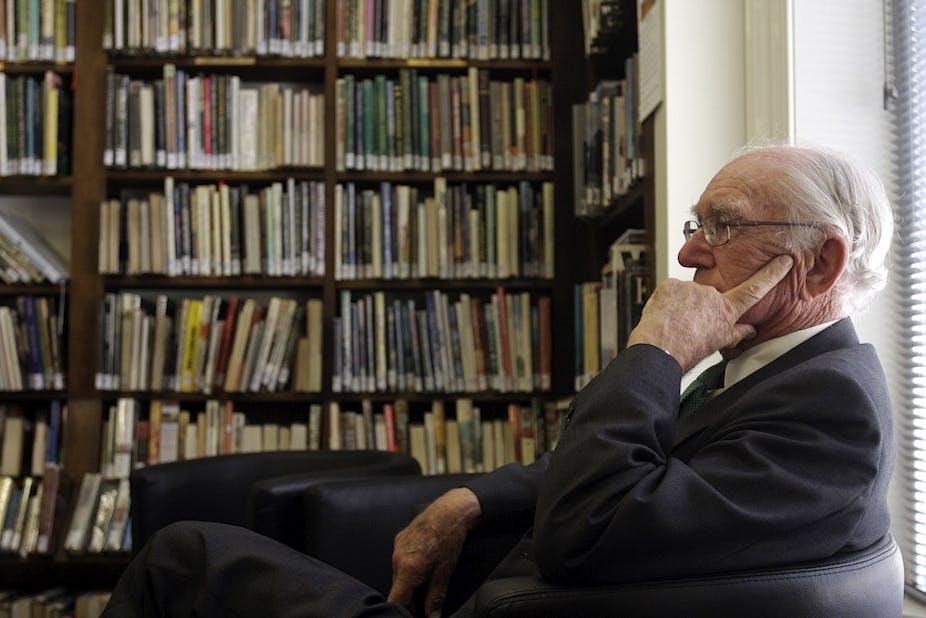
Michelle Grattan ne travaille pas, ne conseille pas, ne possède pas de parts, ne reçoit pas de fonds d'une organisation qui pourrait tirer profit de cet article, et n'a déclaré aucune autre affiliation que son organisme de recherche.
University of Canberra apporte un financement en tant que membre adhérent de The Conversation AU.
Voir les partenaires de The Conversation France

Former prime minister Malcolm Fraser has died at the age of 84. His office said in a statement that he had died in the early hours of Friday after a brief illness.
Fraser, prime minister between 1975 and 1983, came to power in highly controversial circumstances. He was installed as caretaker prime minister after the governor-general, Sir John Kerr, sacked Gough Whitlam.
In his later years, Fraser became a bitter critic of Liberal policies, especially on issues such as the treatment of asylum seekers, and relinquished his party membership. He also strongly warned of the dangers of Australia’s closeness to the United States, most notably in his book Dangerous Allies published last year.
Fraser and Whitlam became close in their retirements, finding common ground on a number of issues.
The former prime minister has attracted tributes from across the political spectrum.
Prime Minister Tony Abbott said: “The constitutional crisis of 1975 was one of the defining political events of our nation. Malcolm Fraser held true to the belief that his actions were in the best interests of Australia. He was determined to ‘turn on the lights’ and restore Australia’s economic fortunes.
"The friendship he built in later life with Gough Whitlam spoke volumes about the character of both men at the centre of the crisis: in their own different ways, they were both fierce Australian patriots.”
Petro Georgiou, who worked for him and later became a Liberal MP, said Fraser was “a giant, the likes of which we’re unlikely to see again”.
Former Fraser government minister Fred Chaney said: “Australia has lost one of its great moral compasses.”
NSW Premier Mike Baird said: “Malcolm had an extraordinary life and his contribution to this country was enormous.
"After leaving office Malcolm used his public profile to raise concerns about humanitarian issues. Malcolm was a giant of Australian public life.”
Opposition leader Bill Shorten said: “The sight of Fraser and Whitlam campaigning together for a republic and standing together at the national apology warmed our hearts and showed how far we had all travelled since the torrid acrimony of the dismissal.”
Former Labor prime minister Julia Gillard said Fraser “in and beyond politics was a leader in the fight for racial equality. His brave stance against the evil of South Africa’s apartheid helped changed the world for the better.
"Malcolm will always be remembered kindly for his commitment to multiculturalism and his specific actions to resettle Vietnamese boat people in Australia.”
Greens senator Sarah Hanson-Young said he was “a politician of principle and leader of compassion. A true gentleman with a heart full of empathy. I am devastated.”
Fraser recently supported her re-election campaign.
Victorian Liberal leader Matthew Guy said Fraser was “a leader and statesman”. He “will always be of the Liberal Party”.
Fraser won two further elections after a swingeing victory in 1975. He was returned with another massive majority in 1977, again beating Whitlam, and won more narrowly in 1980. In 1983, he called an election on the day the Labor party dumped Bill Hayden for Bob Hawke, who defeated him.
Although Fraser came to power on tough economic rhetoric, his government was later much criticised for not doing enough in economic reform. It was left to the Hawke government to undertake the big structural reforms.
Fraser’s government had significant achievements on the social policy front, which included enacting land rights for Aboriginal people in the Northern Territory, in a continuation of the policy framed by the Whitlam government.
Fraser also promoted multiculturalism and established SBS; his government took major environmental initiatives including banning sand mining on Fraser Island and whaling in Australian waters.
In foreign affairs he was pivotal in the Rhodesian settlement that brought majority rule and independence to Zimbabwe. He was involved in the battle against South African apartheid during and after his prime ministership.
Seeking to heal the divisions of 1975, Fraser appointed Sir Zelman Cowen as governor-general to succeed Kerr.
Summing up his record some years ago, journalist and historian Paul Kelly wrote that he was a “both a conservative and a reformer”.
Kelly wrote that he was “the last prime minister before the age of globalisation forced Australia to break from its introspective economic past”.